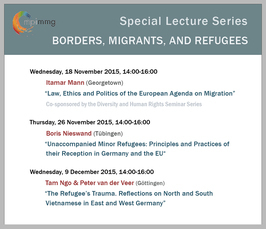"The Refugee’s Trauma. Reflections on North- and South Vietnamese in East- and West Germany"
Special Lecture Series "Borders, Migrants and Refugees"
- Datum: 09.12.2015
- Uhrzeit: 14:00 - 16:00
- Vortragende: Tam Ngo and Peter van der Veer (MPI-MMG)
- Peter van der Veer is Director at the Max Planck Institute. His book on The Value of Comparison will be published by Duke University Press in 2016. Tam Ngo is a Senior Research Fellow at the Max Planck Institute. Her book on the Hmong in Vietnam and the US will be published by the University of Washington Press in 2016. Together they work on a project on the Vietnamese in Germany.
- Ort: MPI-MMG, Hermann-Föge-Weg 11, Göttingen
- Raum: Library Hall

For more details please contact esser(at)mmg.mpg.de.
In “The Theory of Moral Sentiments” (1759), Adam Smith observed that what made us moral beings was the imaginative capacity to “place ourselves in his (the other’s) situation . . . and become in some measure the same person with him, and thence form some idea of his sensations, and even feel something which, though weaker in degree, is not altogether unlike them.” Empathy or ‘Einfühlung’, however, is not a given, but structured according to narratives of connection. Narratives are supported by metaphors, symbols, and crucially images that are globally spread and received. In this paper we explore the narrativization of refugees, and asylum in Germany in the case of the mass exodus of Vietnamese in 1979 and subsequent years. Crucial in the narrative legitimation of admitting 40.000 Vietnamese in Western Germany is the Cold War context. This is illustrated by the simultaneous recruitment of Vietnamese contract laborers by the DDR, the German Democratic Republic. The largest number of contract laborers in the DDR was Vietnamese, amounting to 60.000 in 1989. The paper also examines the aftermath of asylum and contract labor in the encounter of North- and South Vietnamese in unified Germany. Finally, it will make some comparative remarks about the Vietnamese refugee crisis in the 1980s and the Syrian refugee crisis today.